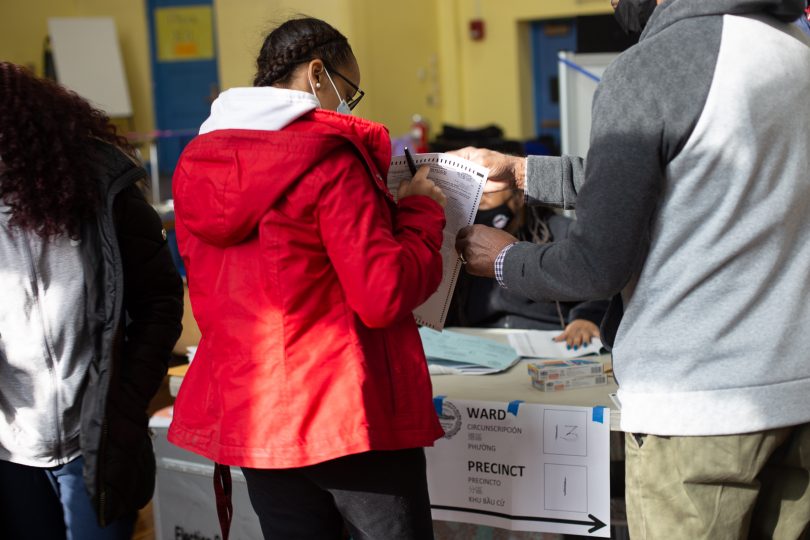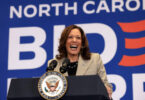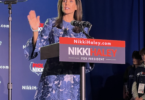By Jintao Zhai
Boston University News Service
Jose Sanchez, 52, walked out of the voting booth with a pages-long pamphlet in his hands. “Vote YES on Question 2,” the bolded advertisement reads. “Let’s make sure patient dollars are spent on patient care.” For Sanchez, referendum questions like this one carries more implications than a gubernatorial seat, staking the future of the state’s healthcare infrastructure and voters’ medical fees.
“Most people vote for the governor, but there are also four questions that I have to choose ‘yes’ or ‘no,’” Sanchez said. “Dental insurance is one of the major reasons why I came here. I’m voting ‘yes.’”
Sanchez showed his pamphlet after walking out of the voting booth. Photo credit: Jintao Zhai, Nov. 8.
As the temperature in Boston plummeted to 50 degrees Fahrenheit Tuesday morning, Boston voters are rushing to their local voting booths, casting a ballot for this contentious yet critical midterm election, one that will impact millions of Massachusetts residents on a number of issues for decades to come.
Among many choices for locals, the Yawkey Boys & Girls Club of Roxbury at Warren Street is welcoming registered voters from 7 a.m. to 8 p.m., and right next to the entrance electoral guideposts in multiple languages and the “Maura Healey Governor 2022” advertisement are juxtaposed, as if signaling another Democratic win in this heavily blue state.
On a federal level, Democrats and Republicans are vying for control of both chambers of Congress, with ideological battles pitching them against each other, but for states like Massachusetts, the midterm election appears much more nuanced. Roxbury voters, in particular, accent Questions 1 and 2.
Massachusetts voters are multilingual, and so is the voting process. Photo credit: Jintao Zhai, Nov. 8.
Sanchez rationalized his choice, saying that increasing regulation on dental clinics could make patients pay less in the future, “giving them benefits at a fair price.” According to the state government website, a “yes” vote on Question 2, or formally, “Regulation of Dental Insurance,” would require a dental insurance company to pay for at least 83% of the premium on patients’ dental expenses, whereas a “no” vote does not change anything to existing healthcare laws in the state.
Sanchez said he disagrees with Question 1, which asks voters whether to increase state tax for income over $1 million from the current flat 5% to 9%. A question that seems to tax only the very rich, could potentially “affect everyone here.”
Voters’ disagreement with a proposal, or with each other, is the norm in any democratic election. An African American man identified as “Mike of Roxbury” said how and how much taxpayers’ money is used is of foremost concern for him. Mike, 59, added that he believes Question 1 should be implemented, as “there should be a larger tax on the millionaires.”
He chose not to share his last name.
The Coalition to Stop the Tax Hike Amendment, a non-profit advocacy group in Massachusetts, argued against voters like Mike, saying that people could face a nearly double income tax if they sell a house in the state. About “50% of millionaires in MA are one-time millionaires, often from selling a home or business,” the coalition lamented.
“If you sell a house that is over a million dollars, then I guess you’re a millionaire. How many people are actual millionaires?” Mike said, reiterating that only a small portion of people would be affected by this tax plan.
Mike added that the surplus resulting from the tax increase could apply to road and traffic improvement, though public education remains a hard-core problem that “nobody could really change.” He called for the public and non-profit sectors’ greater involvement in helping people find a job, especially minorities and the low-income population, harking back to his first job as a Boston Community Development employee.
Urban crimes are a major problem for almost every metropolis in the United States, including Boston. Mike lamented that Boston police officers, whom he said “belong to the highest paid police department in the world,” fail to do a decent and diligent job.
“Why aren’t they outside, walking around? Why don’t we know a cop who just walks through our neighborhood?” said Mike, who compared the Roxbury police forces unfavorably with their Waltham counterparts.
Electoral integrity disconcerts voters nationwide. In the 2020 election, former President Donald Trump pointed to the Democrats’ victory as a result of massive voter fraud despite evidence to the contrary. The whole process of voting — from early registration and mailed-in ballots to voter identification cards and disenfranchisement — turned the left and right against each other.
This year, Mary Eouise joined the Election Protection, a non-partisan, nationwide coalition that seeks to ensure equal opportunity in voting and relies on local volunteers to guide voters to the booth. Besides voting herself, Eouise volunteered at the Yawkey Club from 9 o’clock to noon this Tuesday, assisting voters with her multilingual skills.
“I’m concerned with elections. I just want to do my part. I’m here to help voters, no matter who they vote for,” she said.
Eouise briefly but firmly noted that she is concerned with “the truth, the reality,” chuckling, before rushing to the club entrance to guide incoming voters.





